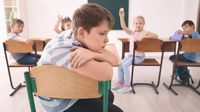Santa Catarina has recorded a staggering 7,719 instances of violence in state schools throughout 2024, according to the latest data released by the Núcleo de Política de Educação, Prevenção, Atenção e Atendimento às Violências na Escola (Nepre). This alarming figure comes to light as the nation observes the National Day to Combat Bullying and Violence in Schools on April 7, 2025, a day that emphasizes the urgent need for effective measures to create safer educational environments.
Among the reported occurrences, physical violence accounted for 16% of the cases, while verbal violence made up 11%, and bullying constituted 3.5%. Disturbingly, the primary victims of these aggressions are often the students themselves, highlighting a critical issue within the educational system.
Looking at a broader timeline, from 2001 to 2024, Brazil has witnessed 43 extreme violent attacks in schools, resulting in a total of 168 victims—115 injured and 53 fatalities. Notably, six of the deceased were the perpetrators of these attacks. Two of the most tragic incidents occurred in Santa Catarina: an attack in Saudades on May 4, 2021, which left three children and two teachers dead, and a massacre in Blumenau on April 5, 2023, claiming the lives of four children.
The rise in extreme violence in schools has been particularly pronounced since 2019, peaking in 2022 and 2023 with 10 and 15 attacks, respectively. Psychologist Apoliana Regina Groff, who specializes in educational psychology, has linked this surge to the social isolation caused by the COVID-19 pandemic. She argues that the isolation led to increased exposure among youths to extremist content on social media, which may have contributed to radicalization among many adolescents.
“I believe we can reflect on how the period during which we were unable to have in-person social contact allowed for immersion in social media contexts, leading adolescents and young people to greater exposure to extremist content and ultraconservative ideas that circulate in communities propagating hatred against social movements and certain bodies,” Groff explained.
Moreover, Groff notes that the current political climate, characterized by polarized ideologies and anti-human rights discourses, has also played a role in escalating violence in schools. “We need to reflect on how, as Brazilian society, we have favored education and human formation that contradict violence,” she added, urging a collective examination of societal contributions to the current situation.
In light of the National Day to Combat Bullying and Violence in Schools, discussions surrounding the issue of school violence have gained momentum, particularly among youth, parents, and educators. The recent launch of the British miniseries "Adolescência" has further fueled these conversations. The series follows a 13-year-old boy who is arrested under suspicion of murdering a classmate, exploring the impacts of bullying and exposure to extremist groups online on adolescent behavior.
According to the "Escola que Protege" report, all identified attackers in school violence cases were male. The report indicates that the combination of hate speech and access to firearms, facilitated by relaxed gun laws and proximity to shooting clubs, significantly increases the risk of violence in educational settings.
Apoliana Groff emphasizes that certain groups are more vulnerable to bullying, noting that structural violence plays a significant role in these dynamics. “When considering other forms of violence in the school context, such as bullying, the UNESCO report highlights that poor children and adolescents from ethnic minorities, migrants, or those whose sexual orientation or gender identity does not conform to cisheteronormativity are at greater risk of being bullied in schools,” she said.
In response to the rising tide of violence, the State Department of Education (SED) in Santa Catarina is actively working to combat these issues through the Nepre, which comprises multidisciplinary teams including education professionals, psychologists, and social workers. The SED engages in various initiatives aimed at raising awareness and preventing violence in schools, as well as providing support to the school community in cases of violence.
The department has also developed pedagogical materials, such as the "Reflexões para a implementação da Política de Educação, Prevenção, Atenção e Atendimento às Violências na Escola," which aim to assist educators in addressing violence in schools. “The goal is to support education professionals in prevention, attention, and response to violence in schools, as well as to address the interconnected aspects of students’ lives that relate to violence as a multifaceted phenomenon,” the SED stated.
Apoliana Groff advocates for investing in teacher training and the development of pedagogical teams, focusing on critical issues such as racism, ableism, LGBTphobia, machismo, and transphobia. “Schools should be spaces for education in human rights, where students feel welcomed, teachers can teach effectively, and students can learn meaningfully, integrating their realities,” she asserted.
She further emphasizes that while schools play a crucial role in combating violence, this effort must stem from an emancipatory education approach, which requires investment in public education policies and the empowerment of schools and teachers. “The solution is not simple. For many years, we have studied violence in educational contexts, produced reports, and listed potential actions to address it, yet we have yet to develop an effective educational policy that tackles this issue as a comprehensive educational project,” Groff concluded.

